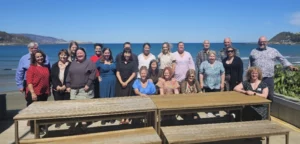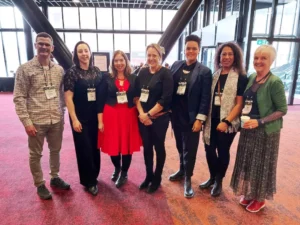We had the immense pleasure of hosting an evening of discussions about our work. Speakers included Lucia Fry from Orion (who always accepts invitations to participate in restorative justice referrals); Mel Hillier from the Christchurch City Council’s Graffiti Team; Kerri Hurman from Project Restore; Jess Plachecki from Simply Resolution and of course, members of the team at RJSOC. It was wonderful to explore the tremendous benefits that flow from restorative work across a wide range of offending types and circumstances.
Why does Orion participate in RJ?
Lucia Fry is a Credit Manager at Orion and has been an enthusiastic supporter of our work over the last 10 years. She explained that the people who crash into Orion’s (uninsured) power poles are members of the community who use and pay for power like everyone else. As such, they deserve the respect of being heard in a restorative setting, where the best way forward can be negotiated with goodwill and mutual consideration. “From Orion’s perspective, it is good to have a voice in these meetings and to explain the impact of peoples’ decisions to drink and drive. Sometimes listening to the offenders’ stories provides another perspective on the reasons for them making the decision to drink and drive into the poles. At the meetings, we take into account those decisions and circumstances and then we decide on the best positive outcomes for both sides.”
This is a win/win process, as the reparation sum may be reduced to take the offender’s circumstances into account. Offenders who have experienced this personal engagement are then more likely to honour the repayment schedule that was agreed on, and also to notify Orion of changes in their circumstances that impact on their ability to make payments.
The Writing Is On The Wall…
Mel Hillier is a recent and enthusiastic addition to the Christchurch City Council’s Graffiti Team. You might imagine that her job is to find and clean up the unsightly scribbles that appear on walls and fences everywhere, and this is certainly part of her work – but not the part that lights her up. A former teacher, Mel thrives on fostering talent and providing appropriate, legitimate spaces for graffiti artists to display their work. Mel and the team’s leader, Kerryn Findlater, are graffiti aficionados, who have their finger on the pulse of the street art scene in Christchurch. They are keen to meet with anyone who is charged with a graffiti offense, to offer them mentorship from other artists who have swapped risky night-time escapades for legitimate, paid opportunities to collaborate with other artists in creating pieces for the public to enjoy. A restorative justice conference is often the beginning of a beautiful partnership.
A Word from Project Restore
Kerry Hurman, Project Restore’s Clinical Director was a welcome member of the Q & A panel at the Stakeholders Information Evening. Project Restore provides a specialist restorative service in cases where sexual harm has occurred. Kerry explained that the agency accepts referrals from the court at any stage of the legal process, but also from anyone in the community who is interested in exploring restorative options after harm has occurred. The timeframes are completely open, as survivors of sexual harm often take years to come forward. Project Restore employs a three-legged stool model for each case, with a survivor specialist working with the person harmed, a specialist who works with the person responsible for harm, and a general facilitator overseeing the whole process. As with all restorative work, the goal is to assist the parties’ healing and development at all stages of engagement, regardless of whether a full conference takes place.
The evening finished with a panel discussion, focusing on frequently asked questions about our work – both informative and entertaining.
Please contact us if you are interested in attending further stakeholder information sessions.


